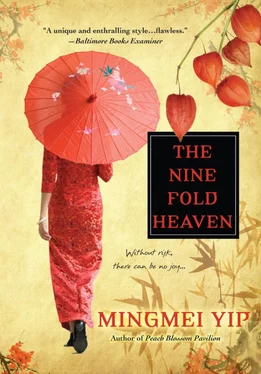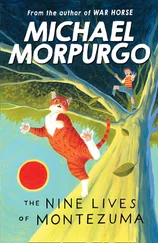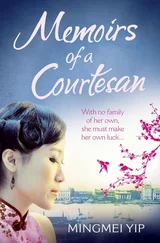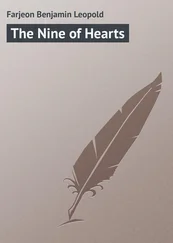“Have you?”
“Sort of, I can cook up a pretty heart-wrenching story based on these flyers.”
Yes, making money based on someone else’s sufferings. But I was no one to criticize. My whole life had been with gangsters who did just that.
But I asked, “Do you know why are these flyers put here, where not many people will see them?”
She looked around, then lowered her voice. “Oh, you never heard of the rumor?”
I shook my head. My ears perked as my curiosity was pricked.
She pulled me away from the wall to a corner as a passing old woman cast us a suspicious look.
She again talked in a heated whisper. “The rumors goes that this orphanage, instead of raising the babies in compassion and grace as their name implies—”
“They ill-treat the children?” I pretended ignorance. Since I grew up here, I knew exactly what they did.
“Of course they do. But it’s even worse. They secretly sell the unadoptable children to black societies for high prices.”
“What? But what for?” I feigned shock, though the answer was obvious.
“The girls would be sent to prostitution houses and the boys to be beggars. You know, the black societies also control the beggar ring. And it’s no use to report to the police,” she chuckled nervously, “since they are on the take from the gangs.”
“That’s terrible. Can’t anything be done?”
“That’s why… if I write about this in the newspaper, I hope the article will put some pressure on the orphanage.”
“But what newspaper is willing to print your story? You mean they’re not afraid of the police and gangsters?”
“We publish our newspaper secretly. Anyway, I’ve got to go. Could you ask your friend with the lost child to contact me?” She took something out from her pocket. “Here’s my card, please call or write.”
“Thank you, I will.”
I pointed to the flyers. “Why doesn’t the orphanage tear these down?”
“They did, but new ones pop up all the time. Sometimes you can’t fight the wrath of the people. Anyway, this orphanage will be doomed. When all their bad deeds come out, the police, in spite of the bribes, will stop protecting them. Miss, I’ve really got to go now. Let me know if you hear anything.”
I watched this skinny woman’s back vanish behind a tree as a sigh escaped from my mouth.
After the reporter left, I decided to go inside the orphanage. Though I had mixed feelings about once again seeing the place where I had grown up. But even if I somehow recognized my little Jinjin, could I just snatch him and get away?
Inside the lobby, I saw an amah sweeping the floor and a middle-aged woman talking on the phone at the reception area. Memories of my childhood rushed back. A decade ago in Compassionate Grace, I was considered the most beautiful orphan, but also the most unhappy—always wondering why no one showed any interest in adopting me. Only later did I realize I had been set aside for Big Brother Wang.
Now, since no one was paying me any attention, I quickly turned a corner and dashed upstairs. On the second floor was the nursery. Inside the big room with dirty, crumpling walls was only one indifferent attendant. She rested her feet on a stool, smoking as she stared out the window. If she had heard me walk in, she showed no sign of it. So I began to walk by the cribs one by one, as if I could somehow recognize Jinjin. All the infants were sound asleep. Of course, they must have been drugged so they wouldn’t cry and make demands. Besides, this saved money for the orphanage because they could get by with fewer staff.
I carefully inspected all the babies who looked like they were about eight months—Jinjin’s age. But none of the sleeping little faces struck me as being my own flesh and blood. If only Jinjin had some kind of birthmark like a mole or a small red patch so I could identify him. But even if he had, I had no way to know since Lewinsky had never told me, nor even let me see him.
Unwilling to give up, I forced my tired feet to carry me into the hall and through the door to the next room. Once I had stepped across the threshold, I noticed something different, even eerie, but couldn’t pinpoint what that was—except it came with an unpleasant smell. Instead of rows of cribs as in the other room, this one had only one single large bed in which was what looked like a huge lump covered with a black cloud. I couldn’t tell what it was in the distance, but it was heaving like a collective heartbeat. I went up to take a close look.
To my horror and disgust, as I approached, the dark cloud lifted and under it I saw several babies sleeping—or dying! It took me a few seconds to realize the black clouds were flies, hungry ones.
I slapped a hand across my nose and mouth, but to no avail as I threw up right on the floor. I didn’t dare to look more but dashed out of the room. Not until I reached the window at the end of the corridor was I able to catch my breath and try to calm myself, still retching. It seemed, since I’d left this orphanage a decade ago, it had deteriorated even further, though it had not been pleasant to begin with. However, I didn’t remember anything as horrible as this.
To get as much distance as possible from this chamber of death, I walked up to the third floor, where the older children stayed. At the top of the staircase, I took big gulps of air, then walked down the hall toward the window. As I stood looking out at the sky with the color of pale ink, I felt a pull at my sleeve. Turning, I saw a girl of seven or eight smiling at me. I was amazed—an orphan able to smile in this horrible place, a place where babies were drugged and left to die. So either this girl was a little slow or she was completely oblivious of the happenings around her. Her face was in the shade, so all I could make out of her features was her chopping-board-thick glasses.
“You want something, little one?”
She nodded. “Big Sister, can you take me to the restroom?”
“Do you live here?”
She nodded again.
“And you don’t know where it is?”
“Sometimes I get lost.”
“Follow me.” Of course I still remembered where the bathroom was.
After she finished her business, she said, “Now can we go to play?”
It was a strange request. “But what game do you want to play, and where?”
“The backyard, where nobody goes.”
“But, little friend, aren’t you supposed to go back to the workroom to help out?”
Unlike the babies and toddlers, children her age had to work; the orphanage did not feed us for free. When the girls were not cleaning they had to embroider, weave, or sew. Boys would be sent out for manual labor like farming, planting, and harvesting. In the winter, they made furniture they would never have a chance to use. Our wages, if there were any, went into someone’s pockets, but not ours.
I said softly to the girl, “Sorry, my little friend, not today.”
“But why not?”
I was surprised by her challenge but intrigued by her spirit.
Before I could respond, she asked, “Big Sister, can you keep a secret?”
Another strange request.
“I’m very good at keeping secrets, so you can tell me.”
“Nobody’s in the workroom today.”
“Really, why?”
“Mrs. Chen is having a party to celebrate her son’s birthday.”
“Who’s Mrs. Chen?”
“Our director.”
“So she’s giving everyone a day off for her child?” I thought, While other women’s babies are eaten alive by flies.
The little girl nodded. “Yes, but Auntie Zhang stayed to look after the babies.”
I did not want to think about only one person left to look after all the babies and children. So I asked the girl, “Where’s the birthday party?”
Читать дальше












